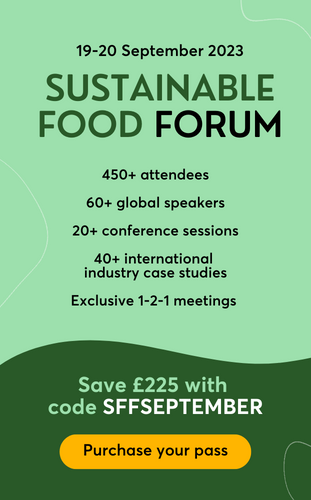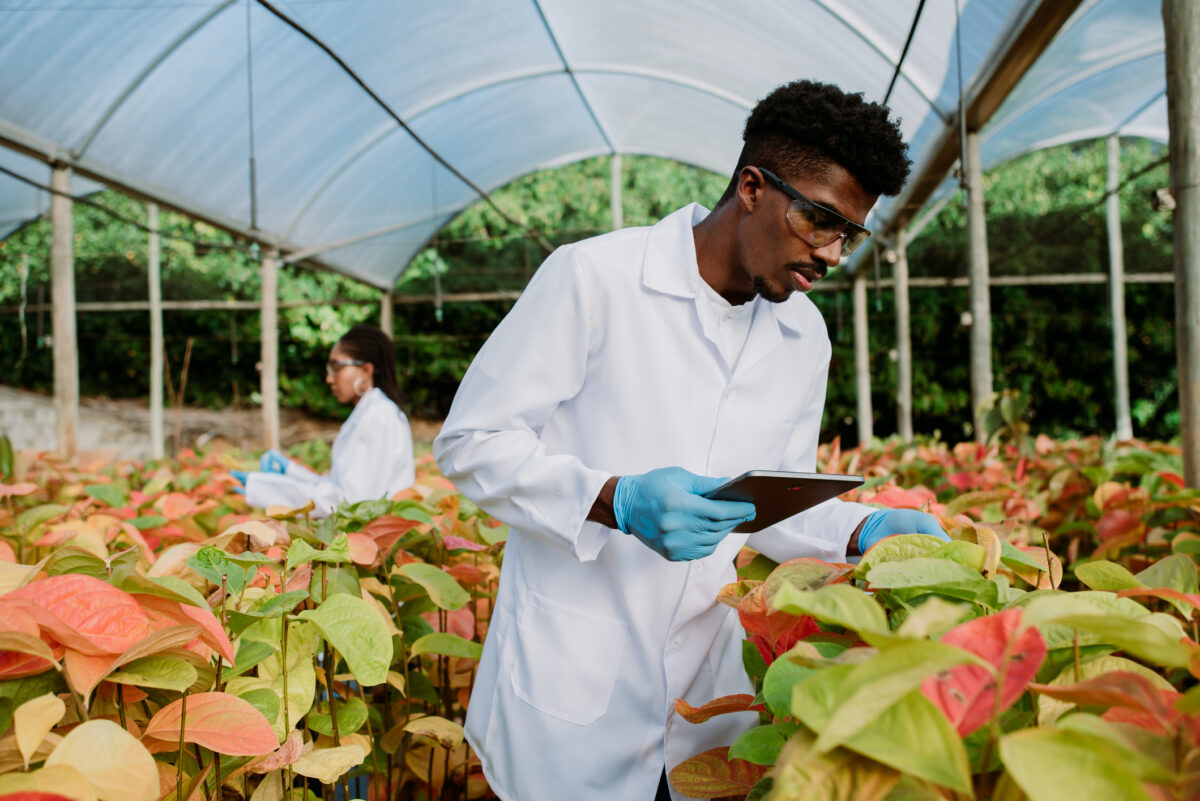Green Jobs: what does a Sustainability Executive do?

Having an interest in sustainability and how to integrate it into food and drinks systems is key for taking on the role of a Sustainability Executive. It involves regular evaluation of a company’s actions to ensure they are reaching specific sustainability-related goals that the Sustainability Executive will have set, or national and international environmental legislation that may affect how the company runs.
The job duties very much depend on the organisation a Sustainability Executive works for. The tasks could include encouraging reassessment of the use of electricity and water in processing plants, the impact of farming technology on the environment as well as fertilisers and pesticides, or even how to tackle food and packaging waste. In the food industry, being a Sustainability Executive is key to ensuring that companies are making the vital changes needed to make their organisation more environmentally responsible.
James Ede is Cargill’s Sustainability Lead for its Starches, Sweeteners & Texturizers group. He says: “As a sustainability executive, you have the ability to build and deliver sustainability impact right through the supply chain from farmers to consumers. It involves engaging the different stakeholders to demonstrate where sustainability is a perfect match to help their business grow and be more resilient.”
This job can also come under different titles such as Sustainability Manager or Environmental Manager, depending on the company.
Eleanor Brooker is the Senior Marketing Manager at Garçon Wines, a company that develops flat, planet-friendly wine bottles.
She recently hired for the Sustainability Executive role, which she says is key to the success of the business: “The role helps create a greener and healthier environment by exploring different materials for our bottles like storied recycled PET or bioplastics, options for conducting LCAs (life cycle assessment) and ensuring our bottles comply with the recycling infrastructure in various distribution markets.
“Just like how the marketing department is often said to be the voice of the customer within an organisation, one of the most positive ways a Sustainability Executive can have an impact is by being the voice of the planet.
“Pushing the company forward to take immediate action in the areas where it’s needed, and to focus on ensuring this action is scalable, is the most impactful way to help create a greener and healthier environment.”
What are the job responsibilities?
- Creating new strategies and action plans to develop sustainability in the company
- Leading on the implementation of sustainable practices
- Promoting sustainable practices and increasing awareness of climate change and the important role of the food and drink industry in tackling global warming
- Depending on experience level, training other staff on sustainability and environmental issues
- Writing up reports and deliver regular presentations on environmental progress in the company
- Working with wider teams to set out standards to deliver environmental change for the better in line with the company’s own ethos
- Ensuring that any new national or international environmental legislation complied with
Who might your employers be?
Employers range from big supermarkets such as Sainsbury’s or Tesco and fast-food chains like McDonald’s, to national government agencies like Department for Environment, Food and Rural Affairs (Defra). The position can also be found in large food producer companies like McCain’s and AAK, as well as more medium-size food start-ups such as allplants.
What qualifications do you need?
This job path doesn’t necessarily require any specific qualifications, but undergraduate degrees that could be useful include:
– Environmental sciences or management
– Environmental engineering
– Energy
– Ecology
– Bioscience
– Earth sciences
Taking on a Master’s degree with a specific focus on sustainability in the food sector could also be helpful to have a greater understanding of environmental management and what this might entail in the food and drinks industry. According to the Institute of Environmental Management & Assessment (IEMA), nearly half of professionals working in an environmental or sustainable have a Master’s degree or more as their highest academic qualification. Some of these degrees include:
– MSc in Sustainable Food Systems at University of Leeds
– MSc in Agriculture and Food Security at Royal Agricultural University
– MSc in Sustainable Cities at University of Leeds
– MA in Food and Development at University of Sussex
– MSc in Environmental Management at UWE Bristol
Finding work experience or voluntary work in the industry in this field could also be extremely valuable in preparation for applying to positions as a graduate. Employers for entry-level positions often expect some work experience background in potential candidates. The Sustainable Food Trust offer internships regularly each year in both Communications & Engagement and Research & Policy, although they are unpaid and have an extremely competitive application process. They do however offer a brilliant opportunity to build your network in the area of sustainable food.
The sustainable charity Forum for the Future also offer internships and work experience in their offices in London, New York, Singapore and Mumbai. The company can’t guarantee a paid position by the end of their internships, but they do offer graduates and students the opportunity to work in different areas including live system change projects in supply chains, food and climate change, and meet professionals in the industry in the process.
Internships will usually be advertised by both The Sustainable Food Trust and Forum for the Future on their respective websites.
Joining relevant societies while at university as well as charities are also key to helping increase employability as it shows a commitment to sustainability in the sector. Nowadays UK universities usually have a long list of green societies to join that focus on different aspects such as the green economy, politics, vegetarian and veganism. There’s also the Students Organising for Sustainability United Kingdom (SOS-UK), which is an educational charity, founded in 2019 by students and staff at the National Union of Students.
What is the salary like?
The starting salary for a Sustainability Executive can range from £18,000 to £30,000, depending on experience prior to starting. A common starting salary for graduates is around £22,000.
Where will you be working?
There is a huge range of food and drinks companies, both large and small, who are hiring sustainability executives. Working hours differ for every company, but in the public sector they are usually 9am to 5pm, while in the private sector, hours can be different and weekend work may be a possibility.
What’s the career progression like?
Some companies have a limited number of sustainability management related positions, which makes progression in a single company more difficult. With more and more organisations hiring for sustainability executive roles however, developing in different food and drinks organisations is an option.
This profession also offers you the opportunity to move into the education and research field at a university.
According to James, if you’re heading into the food and drinks sector with this career path, it’s key to keep an eye on what’s happening across the supply chain and recognising the various challenges existing at each of these stages. “Never underestimate the value of getting out in the fields with growers and farmers, in order to understand the challenges they are facing.
“At the other end of the chain, trail your supermarket aisles, digital space and foodservice outlets to see what’s driving but emerging consumer sustainability trends. Beyond the sustainability gains themselves, by bringing the outside in, you are adding authenticity and credibility to your message.”
While you work, it’s also important to keep up to date on developing environmental legislation and reporting requirements through continuous professional development. One of the ways to do this is by taking on a course or attending events which are offered by national institutions such as the Chartered Institute of Ecology and Environmental Management (CIEEM). Subscribing to the ENDS report is also an excellent way to keep on top of news and reports on the environment and changing laws, as well as finding important contacts of people working in environmental organisations in the country.
The position of a Sustainability Executive offers a wealth of opportunity according to Eleanor: “Speaking anecdotally, it seems that sustainability within many organisations across the food and drink industry is still in its infancy, especially within smaller ones.
“As sustainability becomes increasingly ingrained into the core of an organisation and less seen as a trend, the role of sustainability will only increase in importance in the wider organisation. This offers excellent career progression as a result.
“[…] That also leaves scope for career progression that we don’t even know exists yet – just look at what the creation of social media has led to within marketing career options, for instance. Because sustainability covers such a broad range of topics, outlined by the SDGs, there are so many paths that one could go down to have a varied, interesting, and fulfilling career.“
Is there a demand for this job?
With it being imperative that the food and drinks industry continues to improve their efforts around sustainability, the demand for someone who knows how to make these responsible changes to a company is currently very high.
As Eleanor says, the role is rapidly growing in popularity, making it quite a competitive role: “For our recently filled Sustainability Executive position, we had by far one of the highest levels of applicants we’ve ever had for an open role. As Gen Z starts to enter the workforce in full, these positions will increasingly be sought after, so getting a foot in the door early will be beneficial.
“I see a future where ‘Sustainability’ is as common a C-Suite level position as CEO or CFO, impacting the profitability of a business. And, as reports from the likes of WRI and PwC indicate that more and more CEOs will start to have their performance assessed based on how well the organisation is achieving their sustainability goals, having a background in sustainability experience could mean the sky’s the limit.”
James also agrees, saying: “In effect, when working as a sustainability executive, you are able to develop your learnings from packaging, to agriculture, to supply chain, to finance, to sales; and this is only naming a few areas.
“With new opportunities develop within sustainability on an almost daily basis, this truly is one of the most exciting areas to be involved in right now!”









